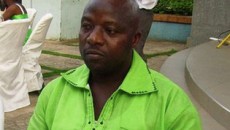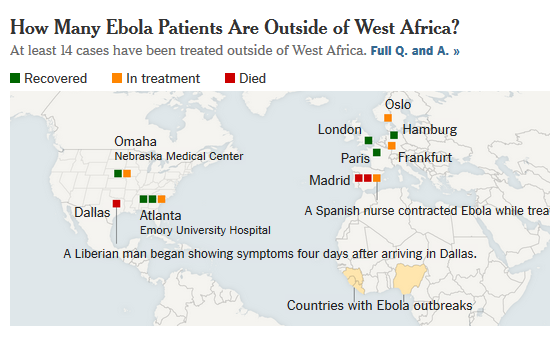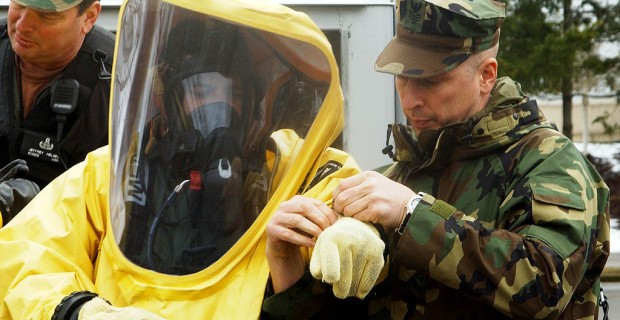DALLAS — For Louise Troh, word of the death of her fiancé, Thomas Eric Duncan, unfolded Wednesday as everything else has since he was found to have Ebola — at a distance.
Dallas County’s chief executive, Clay Jenkins, and the Rev. George Mason of Wilshire Baptist Church drove to the home where Ms. Troh, 54, has been under quarantine with her 13-year-old son and two other young men, all of whom had been living with Mr. Duncan during the time he began to show symptoms of the Ebola virus. They have been under orders from state health officials not to leave the premises for 21 days, the maximum incubation period of the virus.
“We never sat down,” said Mr. Mason, who is the pastor of the church Ms. Troh attends. “We did not touch them. We kept about a three-foot distance from them at all times. This is simply a matter of extreme caution.”
The death Wednesday morning of Mr. Duncan, 42, the Liberian man at the center of a widening public health scare and the first person with a case of Ebola diagnosed in the United States, heightened anxiety and fear here. It also renewed questions about whether a delay in receiving treatment could have played a role in his death and what role it played in the possibility of his spreading the disease to others.
His death came on a day when a sergeant with the Dallas County sheriff’s office who had been in the apartment where Mr. Duncan had been staying was rushed to the hospital and monitored for possible exposure to Ebola.
Federal health officials said that they had not confirmed whether the sergeant, identified as Michael Monnig, had definite contact with Ebola or definite symptoms of the virus, but that he was being assessed. Officials said it could take about 48 hours before they were certain of his condition. He was not one of the 48 people being monitored for the disease.

While there were condolences expressed throughout this city over Mr. Duncan’s death, there were also renewed questions about the handling of Mr. Duncan’s case by Texas Health Presbyterian Hospital in Dallas, and about whether Mr. Duncan would still be alive had he been admitted to the hospital when he first went to its emergency room on Sept. 25.
He was instead released, and returned three days later on Sept. 28 after his condition worsened.
“I trust a thorough examination will take place regarding all aspects of his care,” Ms. Troh said in a statement.
A spokeswoman for the Texas Department of State Health Services said officials there were considering investigating the delay in treating Mr. Duncan for Ebola, including the hospital’s compliance with state health and safety laws and regulations. But she added that the agency’s “top focus right now is the contact investigation and monitoring.”
Dr. Thomas R. Frieden, director of the federal Centers for Disease Control and Prevention, told reporters on Wednesday that although Ebola is fatal in a high proportion of patients, it is important for the disease to be diagnosed early.
“The earlier someone is diagnosed, the more likely they will be to survive,” Dr. Frieden said.
He declined to speculate on whether the delay had contributed to Mr. Duncan’s death. But agency officials have said generally that basic interventions — including intravenous fluids and electrolytes, and maintaining blood pressure — can significantly improve Ebola patients’ chances of survival.
Referring to the sheriff’s deputy being treated and monitored at Texas Health Presbyterian, Dr. Frieden said communities should be vigilant but prepared for false reports of the virus as fear of it spreads.
“There will be rumors and concerns and potential cases, and that is how it should be,” he said.
Mr. Duncan died at 7:51 a.m. Wednesday at Texas Health Presbyterian, eight days after the virus was detected in him on Sept. 30. State officials, following guidelines issued by the C.D.C. on the safe handling of the remains of Ebola patients, recommended to Mr. Duncan’s relatives that he be cremated, and the family agreed.

Texas Health Presbyterian at first blamed a problem with its electronic records system for Mr. Duncan’s release after his first visit, but it later reversed itself and said the system had operated correctly. It remains unclear why, and how, the hospital did not view Mr. Duncan as a potential Ebola case during his first visit to its emergency room, since both the nurses and the doctor had access to the critical information that although his symptoms were not severe, he had recently traveled from West Africa.
After the release of the statement by Ms. Troh, Mr. Mason, the pastor, said that when he and Mr. Jenkins broke the news to her, she had expressed frustration with the hospital’s handling of Mr. Duncan’s case.
“She expressed all the what ifs,” Mr. Mason said. “ ‘What if they had taken him right away? And what if they had been able to get the treatment to him earlier?’ ”
Mr. Duncan spent nearly two decades separated from Ms. Troh, with whom he had a son, Karsiah, a student at Angelo State University, west of Dallas. Mr. Duncan had missed Karsiah’s entire childhood while the couple was estranged, but he had been rebuilding his relationship with both Ms. Troh and Karsiah. In her statement, Ms. Troh said she was dealing with “sorrow and anger” that Karsiah had not been able to see his father before he died.
In the evening, hours after Mr. Duncan died, Mr. Mason spoke at a vigil at Wilshire Baptist and recounted some of the last moments of Mr. Duncan’s life. “The last words that Eric Duncan said were said to a nurse,” he told those gathered. “She asked him what he wanted. She said he wanted to see his son. He was proud of his son. She asked him then where his son was. He said he was in college, where he should be.”
By MANNY FERNANDEZ and DAVE PHILIPPSOCT. 8, 2014 for NYT










